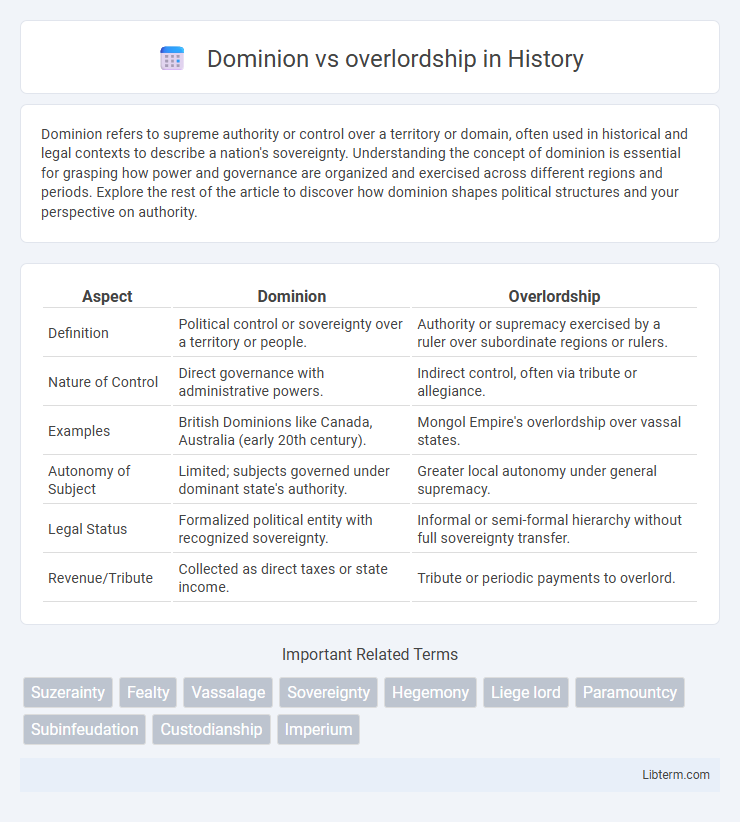Dominion refers to supreme authority or control over a territory or domain, often used in historical and legal contexts to describe a nation's sovereignty. Understanding the concept of dominion is essential for grasping how power and governance are organized and exercised across different regions and periods. Explore the rest of the article to discover how dominion shapes political structures and your perspective on authority.
Table of Comparison
| Aspect | Dominion | Overlordship |
|---|---|---|
| Definition | Political control or sovereignty over a territory or people. | Authority or supremacy exercised by a ruler over subordinate regions or rulers. |
| Nature of Control | Direct governance with administrative powers. | Indirect control, often via tribute or allegiance. |
| Examples | British Dominions like Canada, Australia (early 20th century). | Mongol Empire's overlordship over vassal states. |
| Autonomy of Subject | Limited; subjects governed under dominant state's authority. | Greater local autonomy under general supremacy. |
| Legal Status | Formalized political entity with recognized sovereignty. | Informal or semi-formal hierarchy without full sovereignty transfer. |
| Revenue/Tribute | Collected as direct taxes or state income. | Tribute or periodic payments to overlord. |
Understanding Dominion and Overlordship: Key Definitions
Dominion refers to the legal authority or control exercised by a governing body or individual over a territory or property, often implying direct administration and ownership rights. Overlordship denotes a hierarchical relationship where an overlord holds a superior position, granting permission or protection to subordinate lords while maintaining ultimate authority. Understanding dominion and overlordship requires recognizing dominion as direct sovereignty and overlordship as a layered feudal system of authority and allegiance.
Historical Roots of Dominion and Overlordship
Dominion and overlordship both originate from feudal systems where power was decentralized among lords and vassals. Dominion often referred to the territorial control and sovereign authority exercised by a ruler, emphasizing legal ownership and governance. Overlordship implied a hierarchical superiority, where an overlord held authority over subordinate lords, demanding allegiance and military support.
Legal Perspectives: Dominion vs Overlordship
Dominion refers to the legal authority or control a sovereign or individual holds over a territory or property, establishing exclusive rights and responsibilities within that domain. Overlordship, in legal contexts, implies a hierarchical relationship where the overlord possesses superior authority, often requiring the subordinate party to acknowledge subservience or pay homage. The distinction lies in dominion granting outright control, while overlordship enforces a layered sovereignty structure, impacting feudal responsibilities and property rights.
Dominion in Religious and Philosophical Contexts
Dominion in religious and philosophical contexts refers to the inherent authority or stewardship granted to humanity over nature and creation, often rooted in scriptural interpretations such as Genesis 1:28, where humans are entrusted with responsibility and care for the earth. This concept emphasizes moral accountability and stewardship rather than mere control, distinguishing it from overlordship, which implies dominance and oppressive rule. Philosophically, dominion aligns with ethical stewardship, advocating for harmonious coexistence and respect for the intrinsic value of all beings within the cosmos.
Overlordship in Feudal and Political Systems
Overlordship in feudal and political systems refers to the hierarchical relationship where a superior lord holds authority over subordinate vassals or lords, often involving the granting of land in exchange for loyalty and military service. The overlord exercises control and protection rights, maintaining political dominance without direct ownership of all subordinate territories. This system structured medieval governance, establishing a network of obligations and power centralization under the overlord's influence.
Comparative Analysis: Dominion versus Overlordship
Dominion refers to sovereign control or authority exercised over a territory or people with recognized legal or political legitimacy, often implying self-governance under a higher realm, whereas overlordship denotes a superior lord's power over vassals, emphasizing subordination and feudal obligations. Dominion typically involves a degree of autonomous administration, as seen in historical dominions like Canada within the British Empire, while overlordship highlights hierarchical dominance and direct influence over subordinate rulers or territories. The key comparative difference lies in dominion's blend of sovereignty and dependency contrasted with overlordship's clear-cut hierarchical dominance and control mechanisms.
The Role of Power and Authority in Dominion
Dominion signifies the exercise of sovereign power and authority over a territory or people, characterized by legitimate control and governance. Power in dominion manifests through the enforcement of laws, the administration of justice, and the ability to regulate resources and social order. Authority in dominion is recognized as rightful and binding, enabling rulers to command obedience and shape political structures within their domain.
Overlordship and Its Impact on Governance
Overlordship establishes a hierarchical authority where a dominant ruler exerts control over subordinate territories, shaping governance through centralized decision-making and delegation of power. This system often results in a layered political structure, where local leaders maintain some autonomy but remain accountable to the overlord, influencing law enforcement and tax collection. The impact of overlordship on governance includes reinforced territorial loyalty, streamlined administrative control, and potential conflicts arising from power imbalances between overlords and vassals.
Modern Interpretations of Dominion and Overlordship
Modern interpretations of dominion emphasize sovereign authority exercised through legal and administrative frameworks that balance control with individual rights, reflecting evolving governance models. Overlordship is increasingly viewed through the lens of hierarchical power dynamics, where influence extends over subordinate entities without direct governance, often manifesting in political or economic spheres. Contemporary discourse highlights how dominion entails formal jurisdictional power, whereas overlordship relates more to symbolic or negotiated supremacy within complex social or organizational structures.
Societal Implications: Dominion vs Overlordship
Dominion implies a form of control characterized by authority exercised with responsibility and often consent, fostering social order and collective stability. Overlordship suggests a more coercive and hierarchical power structure that can generate societal tension, resistance, and potential instability. The distinction influences governance models, citizen rights, and the balance between freedom and control in social systems.
Dominion Infographic

 libterm.com
libterm.com